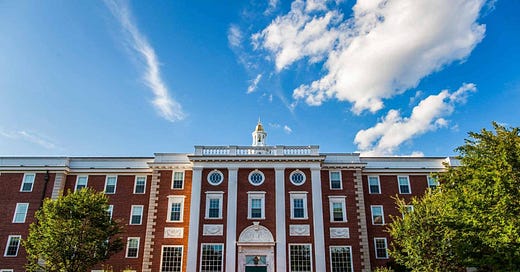One reason I don't always rush to defend the Administration
The Harvard imbroglio is symptomatic of why you don't throw down with Harvard when your team consists of rookies.
From the New York Times news section:
Trump Officials Blame Mistake for Setting Off Confrontation With Harvard
An official on the administration’s antisemitism task force told the university that a letter of demands had been sent without authorization.
By Michael S. Schmidt and Michael C. Bender
April 18, 2025
Harvard University received an emailed letter from the Trump administration last Friday that included a series of demands about hiring, admissions and curriculum so onerous that school officials decided they had no choice but to take on the White House.
The university announced its intentions on Monday, setting off a tectonic battle between one of the country’s most prestigious universities and a U.S. president. Then, almost immediately, came a frantic call from a Trump official.
The April 11 letter from the White House’s task force on antisemitism, this official told Harvard, should not have been sent and was “unauthorized,” two people familiar with the matter said.
The letter was sent by the acting general counsel of the Department of Health and Human Services, Sean Keveney, according to three other people, who were briefed on the matter. Mr. Keveney is a member of the antisemitism task force.
It is unclear what prompted the letter to be sent last Friday. Its content was authentic, the three people said, but there were differing accounts inside the administration of how it had been mishandled. Some people at the White House believed it had been sent prematurely, according to the three people, who requested anonymity because they were not authorized to speak publicly about internal discussions. Others in the administration thought it had been meant to be circulated among the task force members rather than sent to Harvard.
But its timing was consequential. The letter arrived when Harvard officials believed they could still avert a confrontation with President Trump. Over the previous two weeks, Harvard and the task force had engaged in a dialogue. But the letter’s demands were so extreme that Harvard concluded that a deal would ultimately be impossible.
After Harvard publicly repudiated the demands, the Trump administration raised the pressure, freezing billions in federal funding to the school and warning that its tax-exempt status was in jeopardy.
It’s only natural that the second Trump Administration has a competency deficit. It has been hiring staffers with less experience than normal in he federal government.
So, what do you do when your guys aren’t that good at their jobs yet?
You make it easy on your staffers. You let them gain experience.
You focus on easy wins.
You put points on the scoreboard.
You emphasize issues where you can bring the public around to your side by pointing out how absurd the other side is. You call public attention to ex-men in women’s sports rather than on cancer research or weather forecasting.
You accept that voters are in favor of cancer research and that Harvard is pretty good at cancer research.
You don’t go for do-or-die victories against formidable institutions like Harvard, with its $52 billion endowment, when you have only a bunch of rookies who are, let’s admit it, likely to screw up.
Instead, you accept modest victories over Harvard as moving the Overton window. You don’t roll the dice on the assumption that you can defeat Harvard once and for all when your guys aren’t really that good at their jobs yet.
Is this really that complicated?





I don't understand all the nuances of the Harvard imbroglio and the legalisms I find boring but I do support the stripping of federal funds from left-wing universities that hate me. Harvard is a despicable, morally corrupt institution unworthy of federal funds. I like subsidizing Harvard about as much as I like subsidizing the defense of Europe thirty-three years after the USSR ceased to exist.
Betting against Harvard has not been a good idea, historically.
If Trump more narrowly focused on DEI, I think this could have worked, the way law firms are dropping DEI. A sizable constituency within these institutions wouldn’t mind if Trump gave them an excuse to cut DEI. But this was several bridges too far.